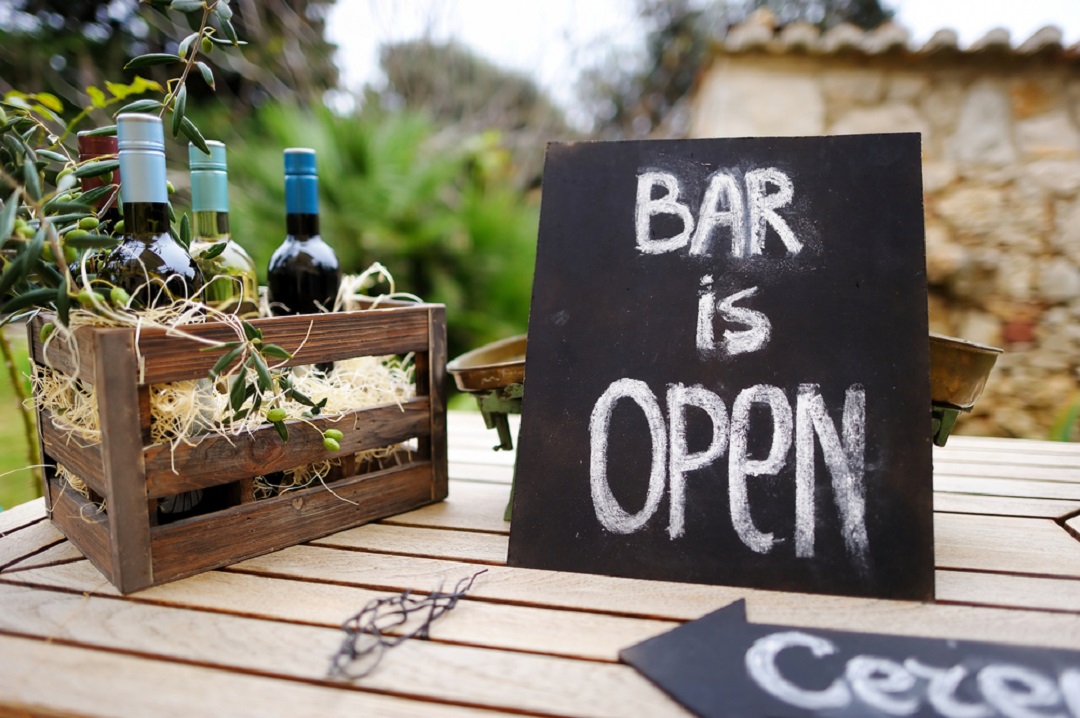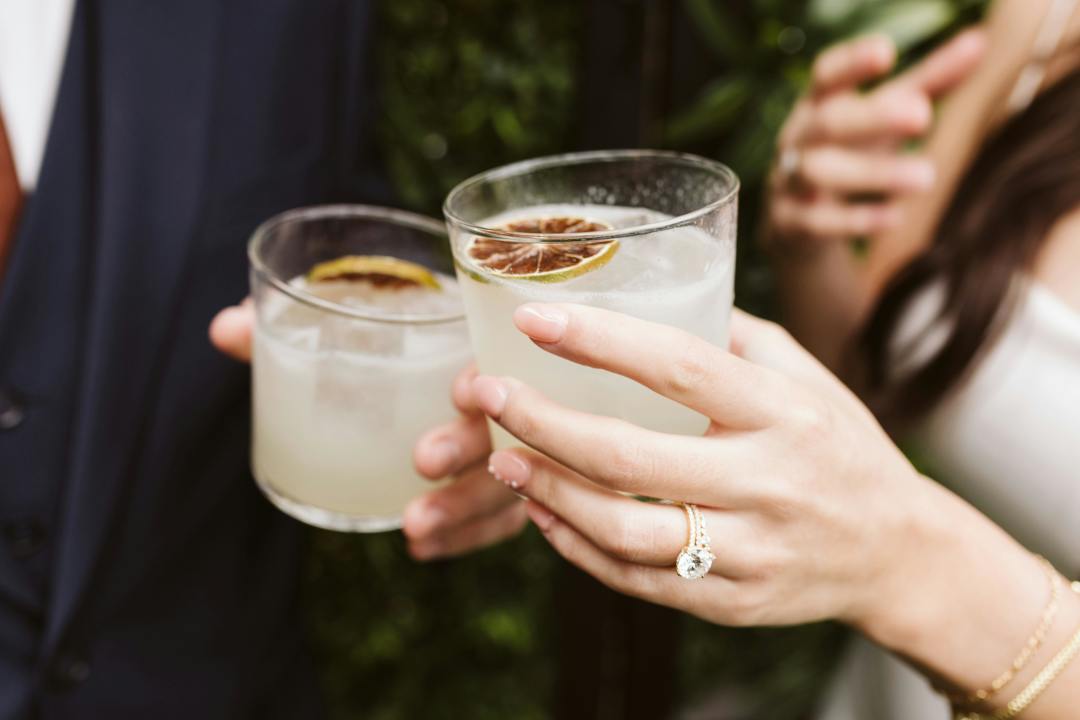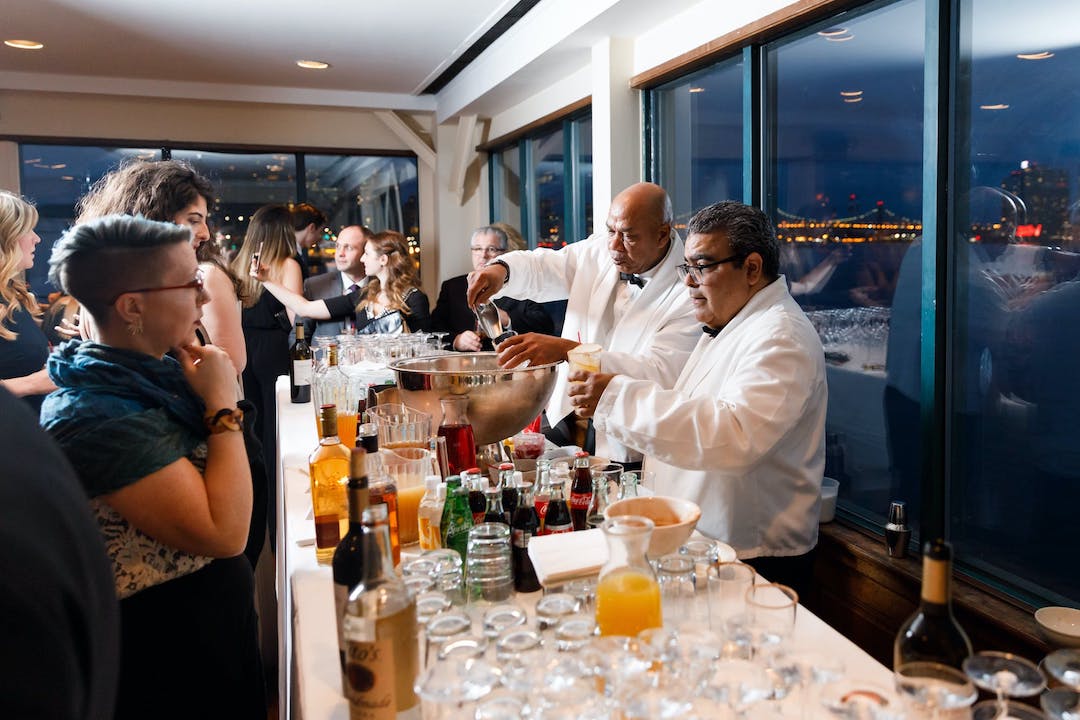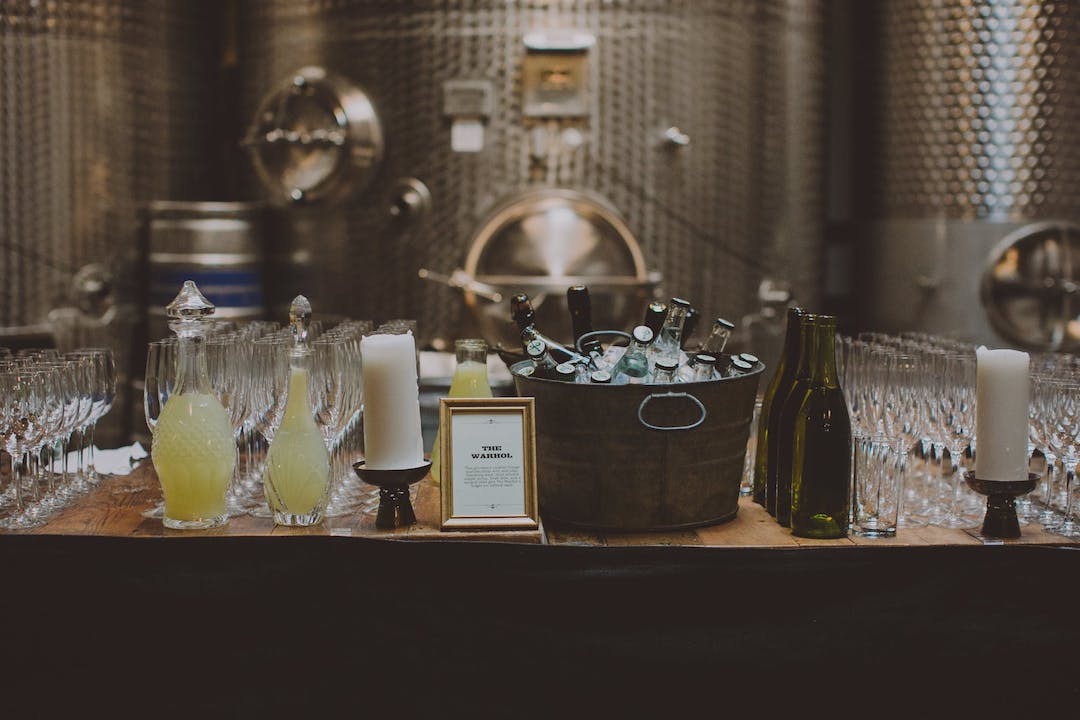- Expert advice/
- Venues & vendors/
- Budgeting/
- How Much Does an Open Bar at a Wedding Cost? Price Breakdown and Budget Guide
- Budgeting
How Much Does an Open Bar at a Wedding Cost? Price Breakdown and Budget Guide
The average open bar cost is $5,541 nationally, representing about 11% of a total wedding budget. See how guest count, packages, and more impact pricing.
Last updated October 23, 2025

- Open bar costs vary widely: Expect to pay $15-$90 per person depending on your location, drink selection, and service style, with most couples spending between $4,400-$6,600 total (about 11% of their wedding budget).
- Location dramatically affects pricing: The same bar service for a Manhattan wedding costs more than in Milwaukee, so factor in your wedding location when budgeting for bar service.
- Smart strategies can cut costs significantly: Save 40-50% by offering beer and wine only, limit service hours to peak times, skip premium brands for mixed drinks, or create signature cocktails instead of a full bar menu.
Your wedding bar can make or break your reception atmosphere, but the costs can feel overwhelming when you're trying to balance hospitality with your budget. The good news is that you have more control over bar expenses than you might think, with options ranging from full open bars to creative alternatives that still keep your guests happy.
Understanding your bar service options helps you make smart decisions about where to spend and where to save. Whether you're leaning toward an open bar, considering beer and wine only, or exploring other creative approaches, knowing the real costs and trade-offs puts you in control of this major budget line item.
What Are Your Wedding Bar Options?
An open bar at your wedding typically costs between $15-$90 per person, depending on your bar type, location, and drink selection. According to the Zola Wedding Cost Index (ZWCI), bar services average $5,541 nationally, with most couples spending $4,400-$6,600, representing about 11% of their total wedding budget.
Understanding your bar options is the first step to creating a realistic budget. Each type offers different levels of service and comes with its own price point, so you can choose what works best for your celebration and your wallet.
Open bar: everything included
An open bar means you cover all drink costs for your guests throughout your reception. This includes beer, wine, spirits, mixers, garnishes, and often non-alcoholic beverages like soda and juice. Your guests never reach for their wallets, and bartenders serve whatever drinks are available within your package.
This is the most expensive option but creates the most generous guest experience. Most couples who choose this route offer either a standard selection of drinks or upgrade to premium brands for an additional cost. You'll typically see open bars categorized as house, premium, or top-shelf based on the alcohol quality included.
The biggest advantage of a full open bar is that it eliminates any awkwardness around payment. Your guests can focus on celebrating rather than calculating drink costs.
Limited bar: beer, wine, and signature cocktails
A limited bar strikes a middle ground between cost and hospitality. You'll typically offer beer, wine, and one or two signature cocktails that reflect your personality as a couple. Some packages also include basic mixed drinks like vodka sodas or rum and cokes.
This approach has become increasingly popular among budget-conscious couples who still want to provide a welcoming bar experience. It allows you to add personal touches through custom cocktails while keeping costs more manageable than a full open bar.
Many couples find that limiting options actually makes decision-making easier for guests. Instead of staring at a full bar menu, people can quickly choose from a curated selection that represents your taste as a couple.
Cash bar: guests pay their way
With a cash bar, your guests purchase their own drinks throughout the reception. You provide the bar setup and bartending service, but individual drink costs fall to your wedding attendees. This is the most budget-friendly option for couples.
While some etiquette experts debate cash bars, they can be appropriate for certain situations, especially when communicated clearly on your wedding website. Many couples choose this route for budget constraints or when hosting very large celebrations where bar costs could become prohibitive.
The key to a successful cash bar is transparency. Let guests know in advance so they can bring cash or cards. Some couples soften this approach by providing one complimentary drink per guest or covering cocktail hour while switching to a cash bar for the reception.
How Much Does an Open Bar Cost?
Your final bar bill depends on which service style you select and how many guests you're serving. The pricing structure varies significantly based on your choices, but understanding the ranges helps you plan accordingly.
Most venues and caterers use per-person pricing rather than charging for individual drinks. This approach makes budgeting easier since you'll know your total cost upfront. However, some providers offer consumption-based billing where you pay only for what guests actually drink.
Bar services are typically priced using consumption estimates of about two drinks in the first hour, then one drink per hour after that for each guest. These estimates help venues calculate package pricing, though actual consumption varies based on your guest list's drinking habits.
Package pricing usually includes setup, breakdown, and basic bar supplies like napkins and stirrers. Premium packages might add extras like specialty glassware or elaborate garnish stations. Always clarify what's included in quoted prices versus what costs extra.
Some venues require minimum spending levels for bar service, especially during peak wedding season. These minimums ensure venues can cover their costs for staffing and setup. If your actual consumption falls below the minimum, you'll still pay the minimum amount.
Gratuity and service charges often add 18-22% to your total bar bill. Some contracts include these fees in quoted prices, while others add them separately. Always ask upfront whether gratuity is included to avoid surprises on your final bill.
What Affects Your Open Bar Price?
Several key factors can significantly impact your final bar service cost. Understanding these variables helps you make informed decisions about where to spend and where to save.
Guest count drives your base cost since most pricing is per-person, but larger weddings sometimes qualify for bulk pricing discounts. Duration of service matters too since most packages cover four to five hours, with overtime charges for extended celebrations.
The type of alcohol you select creates major price differences:
- Well brands: House selections that keep costs lower
- Premium brands: Mid-tier options that add $5-10 per person
- Top-shelf selections: Luxury spirits that can increase costs by $10-15 per person
Bar setup requirements also influence pricing, as venues typically need one bar station per 75-100 guests for efficient service. Multiple bars mean higher staffing costs and equipment rental fees. The physical layout of your venue affects how many service points you'll need.
Service style affects your bottom line as well. Per-person packages provide cost certainty, while consumption-based pricing means you pay only for what guests actually drink. The latter can save money if your crowd drinks lightly, but it removes budget predictability.
Professional bartenders must carry liability insurance, which should be included in service costs rather than charged as an additional fee. Licensed and insured staff protect you from potential accidents or over-serving incidents. Always verify that your bartending service carries proper insurance coverage.
The time of year and day of week impact pricing too. Saturday evening weddings in peak season command higher rates than Thursday afternoon celebrations. Some venues offer package discounts for off-peak dates or multiple services booked together.
How Do Open Bar Costs Vary by Location?
Where you're getting married significantly impacts your bar service budget. Major metropolitan areas typically charge 20-40% more than suburban or rural locations, and regional differences can be substantial.
Geographic pricing reflects local labor costs, licensing requirements, and general cost of living. Urban venues face higher rent, utilities, and staffing expenses that get passed along to couples. Rural areas often have lower overhead costs but might have fewer vendor options.
For example, couples planning weddings in New York City can expect to pay around $14,031 for bar services for 150 guests, while the same service in Milwaukee, Wisconsin averages about $4,375. This dramatic difference reflects local labor costs, venue overhead, and regional pricing standards.
Venue type also influences your costs within any given location:
- Hotels and country clubs: Often charge higher markups due to exclusive service requirements
- Independent venues: May offer more pricing flexibility with outside vendors
- Restaurants and breweries: Sometimes provide better alcohol pricing due to existing supplier relationships
Some venues require you to use their exclusive bar service providers, which can limit your ability to shop around for better prices. Others allow you to provide your own alcohol while requiring you to hire their bartending staff. These policies significantly impact your total beverage costs and should factor into venue selection decisions.
Liquor licensing laws vary by state and municipality, affecting how alcohol can be served and purchased. Some areas require venues to purchase alcohol through specific distributors, while others allow more flexibility. These regulations influence pricing structures and available options.
Transportation and delivery costs add to your bill in remote locations. Bartenders and equipment rental companies may charge travel fees for destinations outside their normal service areas. Factor these additional costs into your budget when considering venues far from major cities.
Smart Ways to Save on Your Open Bar
You can create a generous bar experience without overspending by making strategic choices about service style, timing, and drink selection. These approaches help you prioritize guest experience while respecting your budget.
Choose beer and wine only to cut costs by 40-50% compared to full bar service. This approach still feels hospitable while eliminating expensive spirits. Many guests prefer wine or beer anyway, making this a natural fit for casual celebrations.
Limit service hours by offering open bar during cocktail hour and dinner, then switching to cash bar for late-night dancing. Most guests do their heaviest drinking early in the evening. You can capture the generous feeling of an open bar while controlling costs during extended celebrations.
Skip top-shelf brands for mixed drinks since most guests can't distinguish premium vodka in a cosmopolitan from house brands. Save premium selections for drinks served neat or on the rocks where quality matters more. Your guests will appreciate any cocktail offerings regardless of brand names.
Offer signature cocktails instead of a full bar. Two pre-selected drinks that represent your personalities cost less than unlimited options. Choose cocktails that use similar base spirits to reduce inventory needs. Popular combinations include a whiskey-based drink and a vodka or gin option.
“Adding a signature cocktail for you & your partner is an easy low-cost way to add a touch of personalization to your wedding day.” - Melissa, Zola's Couple Advisor
Buy your own alcohol where venues permit, though you'll pay corkage fees and still need professional bartending service. This works best for beer and wine purchases from warehouse stores. Calculate whether bulk buying plus corkage fees actually saves money compared to venue packages.
Negotiate package deals with your venue or caterer, especially for off-peak dates or multiple services. Venues often discount bar packages when you book catering, planning, or other services together. Ask about package pricing rather than accepting individual service quotes.
Skip champagne toasts and use whatever guests are already drinking for celebratory moments. Champagne for toasts typically costs $2-5 per person above regular bar service. Most guests are happy to raise whatever drink they're holding for special moments.
Consider consumption-based pricing if your guest list includes many light drinkers or non-drinkers. While less predictable than per-person packages, you might save money if actual consumption stays below package minimums. This works especially well for afternoon or brunch receptions.
Provide non-alcoholic signature drinks to reduce overall consumption while still offering special beverages. Creative mocktails give non-drinking guests something special while potentially reducing alcohol costs. Sodas, flavored waters, and coffee stations also provide appealing alternatives.
Plan Your Wedding Bar Budget
Understanding bar service costs and options helps you make decisions that work for both your vision and your finances. Your bar budget should reflect your guest list size, celebration style, and overall wedding priorities.
Start by calculating your estimated bar budget using the standard 11% allocation from the ZWCI data of your total wedding spending. This baseline helps you determine which service style fits your financial parameters.
Get detailed quotes from venues or caterers that include all fees, gratuity, and potential overage charges. Don't forget to factor in the number of bars you'll need based on your guest count. A general rule suggests one bar station per 75-100 guests to avoid long lines.
Consider your guest list's drinking preferences and your reception timeline when choosing between package types:
- Younger crowds: Often prefer beer and cocktails over wine
- Older guests: May lean toward wine and premium spirits
- Mixed groups: Benefit from varied offerings across all categories
A shorter cocktail hour might work well with premium options, while longer receptions benefit from more budget-conscious approaches. Factor in meal service timing since guests typically drink less during dinner courses.
Plan for seasonal considerations that affect both cost and consumption. Summer outdoor weddings often see higher beverage consumption than winter indoor celebrations. Holiday weddings might call for special drinks that cost more than standard selections.
Create a timeline for booking bar service since popular providers get reserved early. Many couples book bar service when they secure their venue and catering, ensuring all beverage needs are coordinated. Last-minute bookings often limit your options and may cost more.
Ready to find the perfect bar service for your celebration? Browse bar service providers in your area who can help you create the ideal drink experience within your budget.
Your Open Bar Questions Answered
Do I need to tip bartenders if gratuity is already included in my contract?
No, if gratuity is already included in your contract, additional tipping isn't necessary. However, if bartenders provide exceptional service, a small extra tip is always appreciated but not expected.
Can I provide my own alcohol to save money on bar service?
Some venues allow couples to provide their own alcohol with corkage fees, while others require exclusive use of their suppliers. You'll still need licensed bartenders even with your own alcohol, so calculate total costs including corkage fees before deciding.
How do I estimate how much alcohol my guests will actually drink?
Most bartenders use the formula of two drinks in the first hour and one drink per hour after that per guest. Consider your guest list's drinking habits, the season, and whether you're serving a full meal when making estimates.
What happens if my guests drink more than my package minimum?
Most venues charge additional consumption at per-drink rates or bill you for opened bottles. Always clarify overage pricing in your contract to avoid surprise charges on your final bill.
Should champagne for toasts be included in my open bar package?
Champagne toasts are typically billed separately at about $2-5 per person rather than included in standard bar packages. You can save money by using whatever guests are already drinking for celebratory moments.
How many bartenders do I need for my guest count?
Plan for one bartender per 50-75 guests for efficient service. Larger weddings or those with multiple bar stations may need additional staff to prevent long lines and ensure timely service.
Up next for you

50 Signature Wedding Drinks: Ideas Guests Will Love
Reception
A signature wedding drink or cocktail can be a great way for couples to add a personal touch to their reception. Get inspired by these wedding signature drinks.

Wedding Alcohol Calculator: How Much to Buy
How To
Use our wedding alcohol calculator to determine exactly how much alcohol you should buy for your wedding. With this expert guide, ensure a perfectly stocked and joyful celebration!

Cash Bar at Wedding Explained + 6 Tips to Save Money
How To
One way to save money on your big day is to have a cash bar wedding. Our guide includes cash bar etiquette and invitation wording samples.

Open Bar Weddings: A Guide
How To
Open bar weddings are something that couples need to factor into their wedding budget. It can be affordable with our ultimate guide to having an open bar.
- Expert advice/
- Venues & vendors/
- Budgeting/
- How Much Does an Open Bar at a Wedding Cost? Price Breakdown and Budget Guide
Find even more wedding ideas, inspo, tips, and tricks
We’ve got wedding planning advice on everything from save the dates to wedding cakes.
